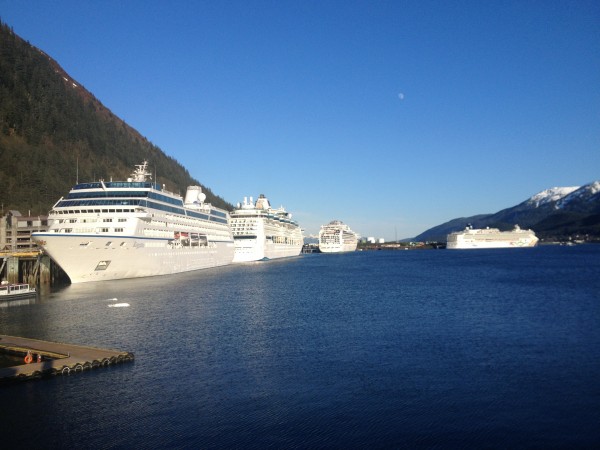
Every summer, a million tourists pass through Southeast Alaska. It’s a boon to local retailers, who rely on the extra customers to make up for slower winter months. But with lots money being spent, business can get dirty. This spring, the state responded to complaints that onboard shopping experts were misleading passengers and smearing local stores by hitting these programs with a new set of rules. APRN’s Alexandra Gutierrez wanted to find out if the new regulations are actually working.
Just about every other store in Juneau’s shopping district sells jewelry. They advertise diamonds and tanzanite, steep discounts and free charms. But a sign on one storefront stands out: “Don’t see us on your cruise ship map??? We’d rather not give your cruise ship a kickback!!”
MEHAN: We put up that sign because a lot of people were unaware of the gimmicks that were going on the cruise lines …
Of the half dozen local business owners I talked to about these kickbacks, Mehan was the only who would agree to be quoted. Even then, he wouldn’t let me use his real name, out of fear of getting blackballed by the cruise industry.
Years ago, Mehan used to pay $25,000 plus 10 percent of sales to be part of the cruise shopping programs. The shopping programs are run by media companies, who then pay the cruise lines to have their employees — known as “port lecturers” — on board the ship. These port lecturers are supposed to work like shopping ambassadors, guiding tourists to trusted retailers. But even though Mehan was part of their program, customers were still steered to chains with stronger ties to the industry. So he stopped paying. Then Mehan started hearing troubling things from passengers.
“‘We were told to only go to certain stores because the other stores are people who sometimes don’t sell the real stuff and we are not responsible for it,’ and stuff like that,” says Mehan. “So that’s like a scare factor.
These kinds of complaints got so bad that the State of Alaska started investigating the companies who hire the port lecturers and give the cruise lines a cut of their earnings to have them on board.
Ed Sniffen handles consumer protection for the state, and he says it wasn’t just local businesses who were upset. Passengers were also saying they’d been ripped off.
“‘Hey, I bought this diamond at this shop, and they told me that it was a two-karat something, and I paid $20,000 for it. When I got it back home and had it appraised, it was really only worth $5,000.’ You know, some of those kinds of things,” says Sniffen.
Port lecturers operate on cruises across the world, but Alaska is the first place to crack down on their employers.
In February, the state agreed to a $200,000 settlement with Onboard Media, Royal Media Partners, and the PPI Group — the three Florida-based companies that put port lecturers on Alaska cruise voyages. The companies didn’t have to admit any wrongdoing, but they did have to start requiring port lecturers to disclose that they didn’t work for the cruise lines and that what they were doing was a type of advertising. They were also prohibited from disparaging stores that didn’t participate in their programs and from making misleading statements about sale prices and return policies.
None of the major cruise lines that operate in Alaska — Carnival, Princess, Holland America, and Norwegian — responded to emails asking about their relationship with port lecturers. Royal Media Partners and the PPI Group also ignored interview requests. Only Onboard Media answered questions about the settlement terms.
“[The settlement] simply formalized policies that Onboard Media has always followed,” wrote Noelle Sipos, a spokesperson for Onboard Media, in an e-mail. She added that the company is complying with all of Alaska regulations, but that they’re not applying the state’s rules to other places.
“The program in each region is tailored to support the requirements of the local authorities,” wrote Sipos.
So, are these regulations doing anything? Right now, the attorney general’s office is reviewing about 70 recordings of port lecturers in action, and it looks like filming them is helping. Sniffen says while things aren’t suddenly perfect, most of the feedback on the ground has been good.
“What we’re hearing is that generally things are better. That things have gotten a little cleaner,” says Sniffen. “Passengers aren’t saying the things that they used to say.”
Before Cindy Dollar gets off her cruise ship, she’s given a shopping map, a bunch of coupons, and a tote bag for her haul. She’s vacationing from Texas, and she says there’s serious pressure to spend.
“Yeah, it’s constant,” says Dollar. “I mean if you let yourself, you can be barraged with the whole shopping experience on the ship.”
From what she’s seen, it looks like the port lecturers are following the state’s new rules. They’re putting disclaimers on promotional materials, and reading from scripts that describe their presentations as marketing. They’re still pushy, but at least you know where they’re coming from.
And so far, their pitch doesn’t seem to be working on her. Dollar doesn’t plan on buying from the stores that are being hyped up, and she definitely isn’t thinking about making any huge purchases.
“I plan to bring back a few souvenirs for family and my petsitter,” Dollars laughs.
She thinks a local gift shop will do the trick.
agutierrez (at) alaskapublic (dot) org | 907.209.1799 | About Alexandra




